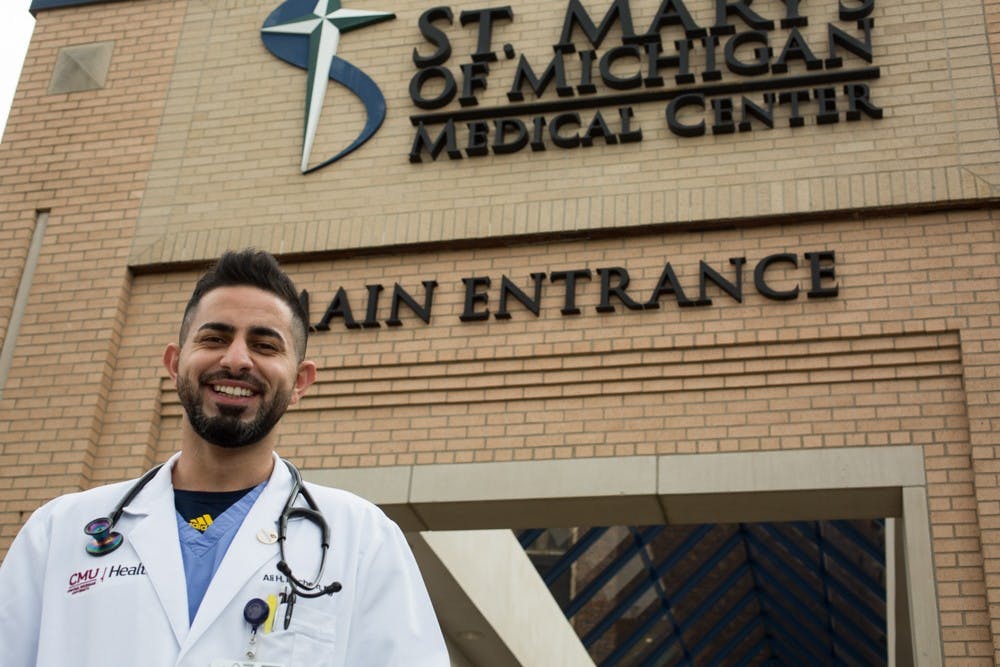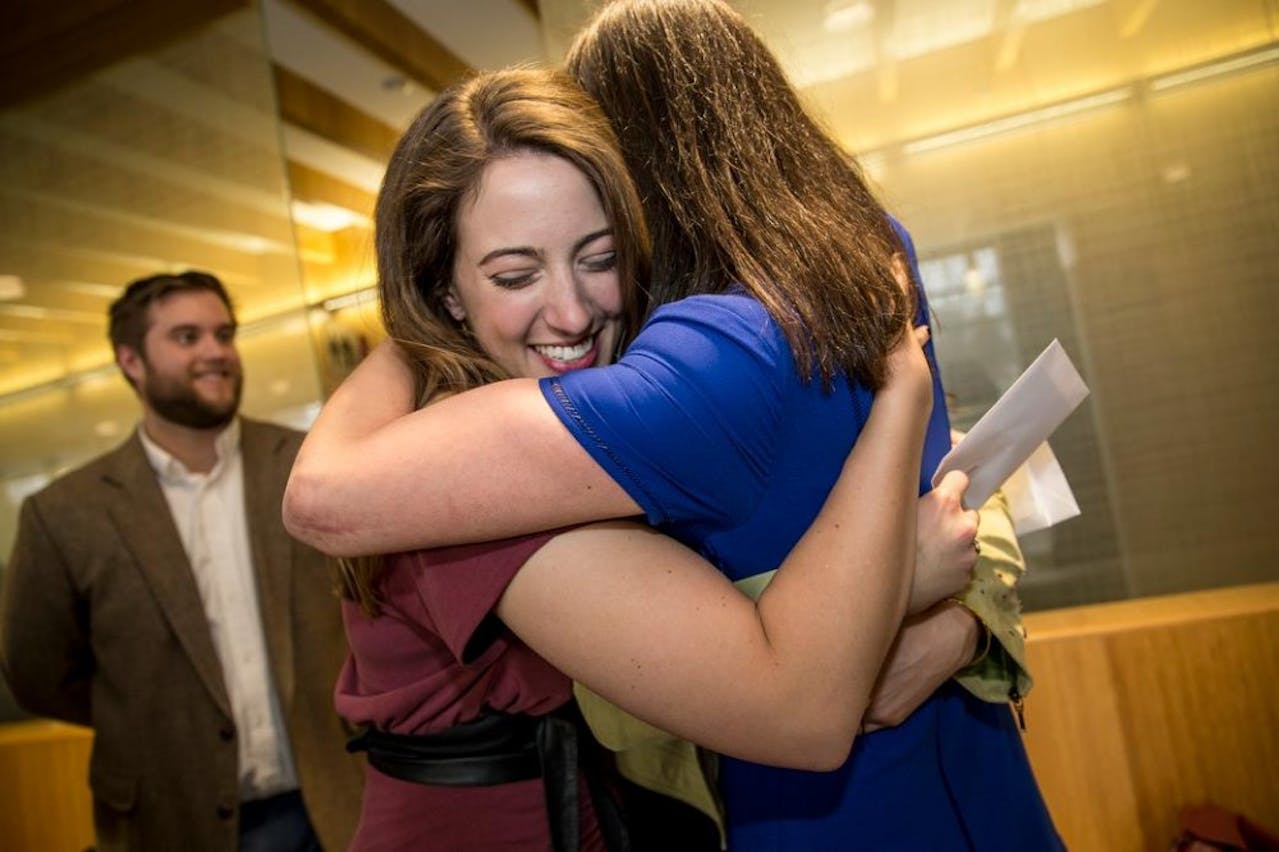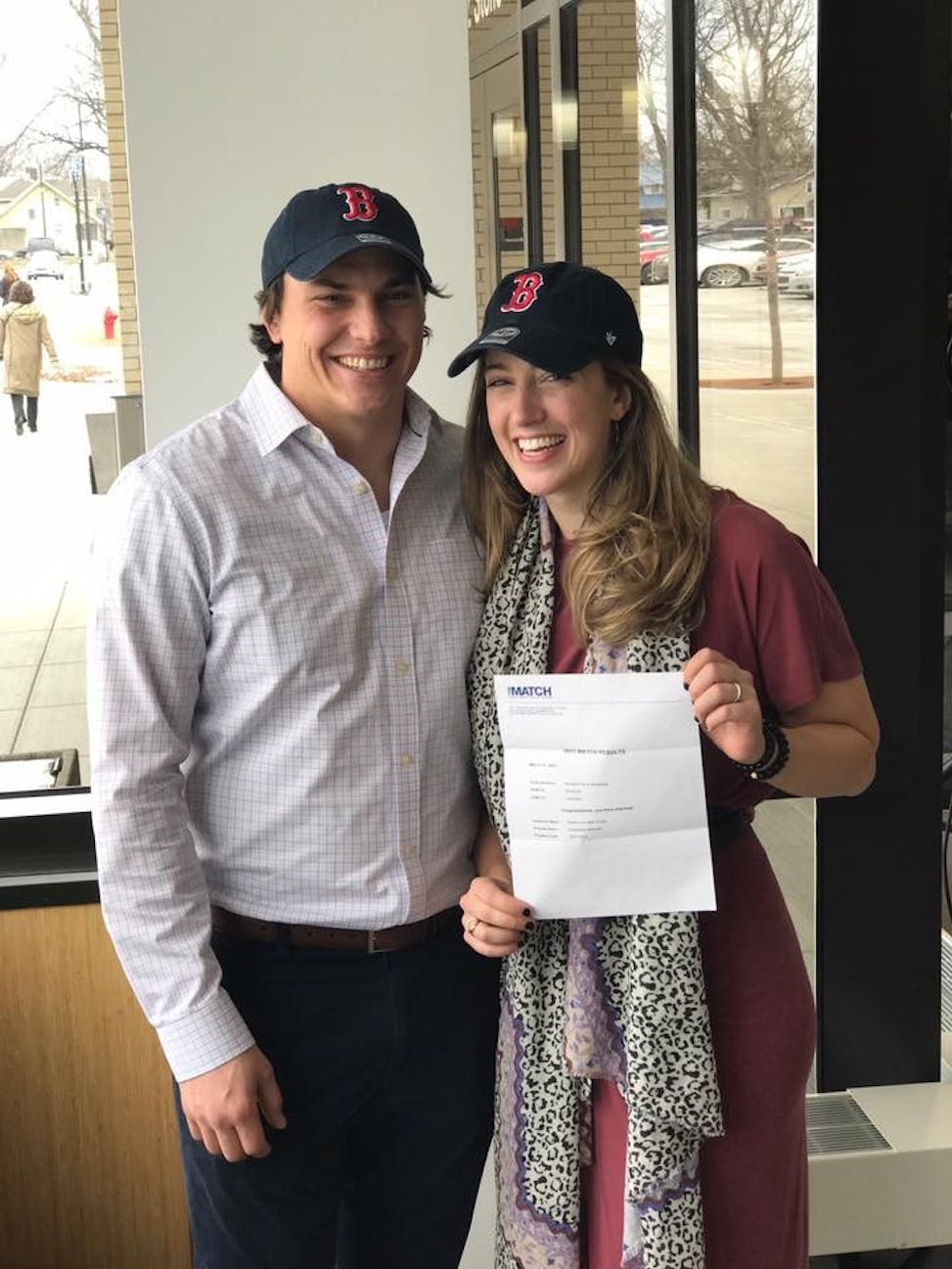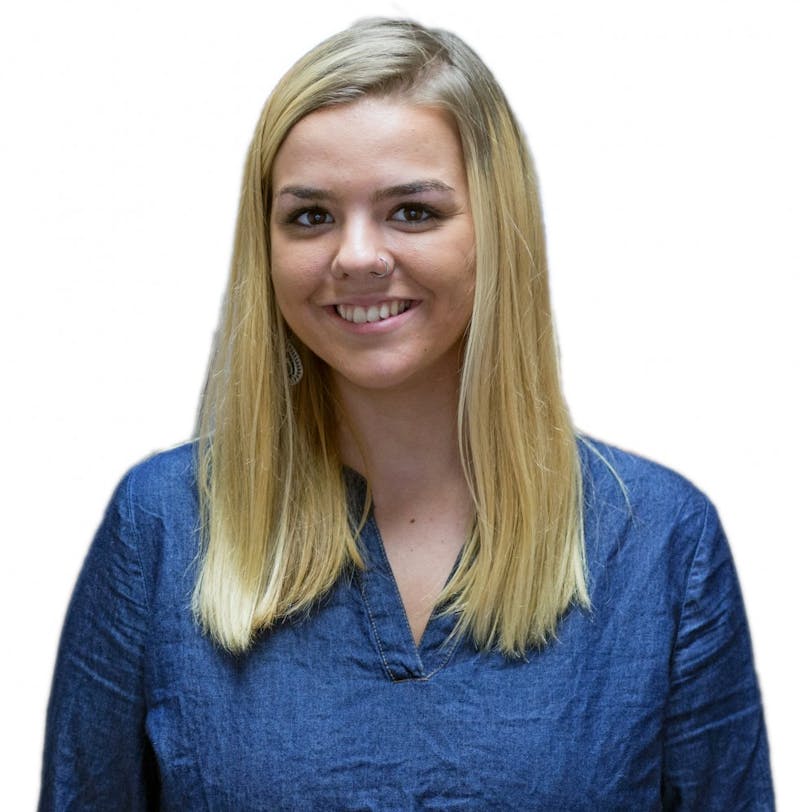CMU's College of Medicine graduates serve residencies across the U.S. following 100 percent placement rate from last year

Growing up in a town of about 6,000 people, and relocating to a city of more than 100,000 to pursue a passion may sound difficult, but for recent College of Medicine graduate Abby Fredrickson, her new location feels like home.
In 2016, Central Michigan University’s College of Medicine inaugural class graduated 62 students—all of whom had a 100 percent placement rate for their residencies. Although many of them completed their undergraduate degrees and medical school in Michigan, they all didn’t stay there. Over half of them—34—went out of state.
Fredrickson grew up in Ishpeming, a small town located in Michigan's Upper Peninsula. She is now serving her residency more than 700 miles west, through the University of North Dakota in Grand Forks, North Dakota.
Working in the psychiatric division at Sanford Medical Center in Fargo,—Fredrickson wanted to stay in the Midwest when it came time to apply for her residency.
She completed her undergraduate degree at Northern Michigan University, earning her bachelor's degree in biology with an emphasis in physiology. Fredrickson enrolled at CMU's College of Medicine in 2012.
Preparing for success
Third year of medical school is when students begin their clinical years and get to experience different areas and decide what interests them. Fredrickson said students also start forming relationships with mentors to in order to receive recommendations.
When it came to the College of Medicine, she said it prepared her for being comfortable with patients since they started introducing clinical work in their first two years medical school.
“That was a big thing, because then when we got into the clinicals we were actually already ahead of the game,” Fredrickson said. “We could advance our learning more than if that was the first time we had ever been in contact with patients.”
In psychiatry, she said her day-to-day work is never the same due to rotations. Her normal day for inpatients unit is working with patients, discussing their medical history and completing physical exams. Writing notes and computer work is what takes the longest for the job, she said.
“My residency is going absolutely wonderful,” Fredrickson said. “It’s been the light at the end of the tunnel that you’re constantly striving towards in medical school. (It’s) so great to have that autonomy where you can write the notes, dictate care and have more of a voice as a resident than you ever do as a student.”
For her new environment, Fredrickson is settling in well and hasn’t had trouble adapting.
“Being out in North Dakota feels like home to me,” Fredrickson said. “Being from the Upper Peninsula originally, (it has) the same type of people, the same attitude (and) people are brought up the same way. Everyone is almost overly nice.”
In October, during their fourth year of medical school, students start applying for residencies. The interview process lasts until January of the following year. Students use a process where they rank the residencies they are most interested in, and programs do the same with applicants.
The system is designed to give applicants the best possible scenarios to train for the programs they're passionate about in a location they're interested in.
No place like home
In March, "Match Day" takes place. This is when students find out what residency they've been placed in.
According to The Match—The National Resident Matching Program, the total number of residencies offered in 2017 across the U.S. was 31,757. This data was an all time high and 1,007 more residencies were offered in 2017 than 2016.

For Ali Hachem, this day was filled with excitement, discovering he was matched with one of his top picks. Hachem, is serving his residency with CMU's College of Medicine at St. Mary's of Michigan in Saginaw.
He is one of the 29 doctors who stayed in Michigan.
A native of Dearborn, Hachem earned his bachelor’s degree in Biological Sciences at University of Michigan—Dearborn. He was thrilled to be placed at St. Mary's in Internal Medicine, where he said he worked as a student.
“The faculty, the residents at the time, they were all really supportive and made it seem like a very good learning environment,” Hachem said. "I thought it would offer me the tools that would help me succeed.”
Being a medical resident, he admitted he likes being able to make decisions regarding patients and their care.
“I enjoy Internal Medicine," Hachem said. "The problem-solving aspect that (goes) along with patient care. A lot of times it’s prolong patient care that you don’t get much in these other fields."
Jennifer Churchill, director of marketing and communications for the College of Medicine discussed the topic of the continuing shortage of number of physicians around the country. According to the Association of American Medical Colleges, a press release from March 2017 projects a shortage of 40,800 to 104,900 doctors.
When it came to applying to residencies, Hachem said he was looking mostly in Michigan and the Midwest, but applied to a few around the country. He was very interested in working in Saginaw.
“Saginaw is like a goldmine. There is so much to take out of it,” Hachem said. “It's very home feeling, it's very close. You run into your patients all over town. There’s a need for positions here. I think the medical school has done a good job trying to drag that point home.”
Hachem noted the importance of wanting to stay in Michigan for his residency for family reasons and to serve his state.
“This is where all my family and friends are so I wanted to be close to them,” Hachem said. “Michigan also has a developing shortage of physicians and we have great (in-state) programs. There was no good reason for me to leave.”
From MI with love
Madeline Brockberg is serving her residency at Boston University Medical Center in the Emergency Medicine division. The Birmingham native earned her bachelor's degree at University of Michigan in Brain, Behavior and Cognitive Sciences.
When applying for residencies, Brockberg said she didn't have a specific location in mind and was "looking all over." She applied to all the programs in Michigan, as well as many in the Midwest.
One of the reasons she attended the College of Medicine because they have a mission and focus on to help underserved populations, which is something Brockberg looked for in residency programs and "plan(ed) on practicing throughout (her) career.”
Brockberg noted the competitiveness of the process, explaining that on average, to have a good chance of matching, a student needed to have more than 12 interviews with the different programs.

"(I was) really excited about (going) pretty much everywhere I was applying, and was happy to match with Boston," Brockberg said. "I just wanted to be in a program that (had) those values that were important to me. Boston Medical Center is a big hospital in Boston, it serves a very large community, particularly an underserved community."
Describing a normal day in her residency, she said every day is different—depending on the rotation of department she is in in the hospital. She is in Internal Medicine within the Emergency Medicine Department.
Being more than 900 miles away from Michigan, when it comes to adapting to the new location, Brockberg said she hasn’t had trouble. She didn’t feel there was any challenge in Boston she wouldn’t be facing somewhere else.
“I wanted a place that had a commitment to their community and a place that had a strong culture of education, working with residents to help make them the best doctors they can be,” Brockberg said.
She also noted the value of community she learned in her time at CMED. That aspect was something she hoped to fulfill in her residency in Boston.
“(I wanted) a place I felt like the residents were supportive, built each other up and were there for each other," Brockberg said. "Residencies are a difficult time. It's important to have people surround you that can be there for you.”
When it came to how Brockberg's residency has been going so far, she said she has enjoyed it and been learning and challenged in “exciting new ways.”
“I’m really enjoying the people I’m working with,” Brockberg said. “I’m very proud to be able to provide the care we provide to the community. Boston Medical Center has a reputation will provide excellent care to anyone who walks in the door and it’s something all the residents around me have a lot of pride in. I (know I) do."




